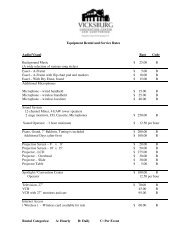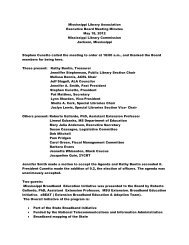Full Text (PDF) - Mississippi Library Association
Full Text (PDF) - Mississippi Library Association
Full Text (PDF) - Mississippi Library Association
- No tags were found...
Create successful ePaper yourself
Turn your PDF publications into a flip-book with our unique Google optimized e-Paper software.
Page 15 Vol. 67, No. 1, Spring 2003 <strong>Mississippi</strong> LibrariesThe Web in ReviewEdited by Steven Turner, The University of Southern <strong>Mississippi</strong>A Review of the Principia Cybernetica WebKenneth EvansAcquisition/Receiving Specialist& SLIS Graduate StudentThe University of Southern <strong>Mississippi</strong>kenneth.evans@usm.eduThe Principia Cybernetica is an onlinereference tool conceived by Soviet scientistValentin Turchin in the late 1980s; it isdesigned to explore philosophical and scientificquestions from a particularly cyberneticor systemic point of view. Given thatClaude Shannon’s mathematical theory ofinformation understands information asordered signals against a backdrop of noise(Gimon, 2002), and cybernetics as mainlyconcerned with information feedback incomplex systems, a database such as thePrincipia Cybernetica could prove usefulto librarians and information scientistsseeking to better understand their place inthe wider information revolution and cyberneticparadigm shift.An interesting aspect of this databaseis that it emphasizes the cyclical and networkednature of the medium it occupiesas a boon to understanding the subject itseeks to illuminate. That is, the Internetas a human/machine cybernetic systemis ideal for communicating ideas aboutcybernetic systems. Or as the PrincipiaCybernetica (PCP) says of itself:“Principia Cybernetica’s aim can bedefined as: integrating the knowledgeavailable in the domain of cyberneticsand systems science with the helpof cybernetic methods, as a first steptowards integrating the whole ofhuman knowledge available in thedifferent disciplines.”ACCURACY AND AUTHORITYEach article within the Principia is wellcross-referencedwith hypertext notes, aswell as being complete with references tooutside sources of information at the bottomof each webpage. The articles arewritten by academics for the use of academics,generally, but are accessible tothe lay person (or academics from otherfields) mainly due to the hyperlinked termsembedded in each article. The article on“the socio-technological singularity,” forinstance, was written by Francis Heylighen,a research professor at the FreeUniversity of Brussels (Vrije UniversiteitBrussel) working on the evolution of organizationalcomplexity, and a specialist incybernetics and cultural evolution.Although it is sometimes difficult for anon-specialist to know the accuracy orinaccuracy of any given article in a timelyway, often due to the technical nature ofthe subject, the database is built openlywith references to other sources, so thatany particular entry can be verified via theinformation given as reference-links andthrough the reference tools (an onlineglossary, etc.) within the Principia.COVERAGE AND CURRENCYThe Principia covers many subjectsand areas of knowledge pertaining towhat is called “systems science” andcybernetics. Under these auspices, thePrincipia examines the fields of informationscience, computer technology, biology,physics, mathematics, cosmology andphilosophy through the lens of holism,networks, and iterative systems. TheWebsite is rather extensive for this reason,and the coverage is, well, awesome.Principia is apparently modified monthly,with individual articles being updated asoften as weekly. An archive lists the topicscovered in each entry or article,chronologically or thematically, for yearsback.This database apparently endeavors toremain up to date, and it is obvious thatthe contributors are excited about theirtopics and strive to keep current in theirareas of academic inquiry.CONCLUSIONThe Principia is an amazing databasefor its ease of use, accuracy, imaginativeand helpful internal organization (thenumber of access points is staggering),and range of topics covered. It is accurate,current, and, despite its sometimesextreme technicality, user friendly.The Principia is more than just adatabase of information on topics relatingto systems. It and tools like it, due to thesubjects that it covers and the way thatsuch subjects are covered (i.e. cybernetically),could be at the vanguard of theinformation revolution. As Frijof Caprasays in his The Web of Life, an excellentintroduction to systems science, as it bearson biology and physics, science is nowturning its attention away from the myth ofmatter and toward the fact of energetic andinformational relationships (Capra, 1996,p. 6). The conceptual tools of cyberneticsare essential to information science, and,therefore, quite pertinent to librarians. In aworld increasingly built and busied by theexchange of information, systems scienceand cybernetics allows us to think furtherinto a truly networked and cyberneticfuture. The Principia and tools like it maybe in a most interesting, and perhaps evenpivotal, position to connect people andideas about the nature of the comingchanges during the coming changes.Check it out at http://pespmc1.vub.ac.be/REFERENCESCapra, F. (1996). The Web of Life. NewYork: Doubleday.Gimon, C. A. Heroes of Cyberspace: ClaudeShannon. INFONATION. RetrievedDecember 4, 2002, from http://www.skypoint.com/~gimonca/shannon.html














